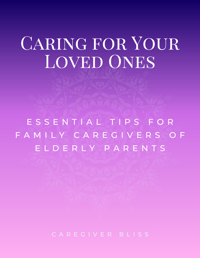How Caring for an Elderly Loved One Impacts Your Health

As our population ages, an increasing number of individuals find themselves in the role of caregiver for elderly loved ones. While the act of caring for a senior family member can be deeply rewarding, it comes with its own set of challenges that can significantly impact the caregiver's health.
In this article, we explore the various dimensions of caregiving and dive into how this responsibility can influence both the physical and mental well-being of those providing care.
The Physical Toll
Caring for an elderly loved one often involves physically demanding tasks such as lifting, bathing, and assisting with mobility. These responsibilities can take a toll on the caregiver's body, potentially leading to issues like back pain, muscle strain, and fatigue. The daily demands of caregiving may compromise the caregiver's own health, making it crucial to strike a balance between meeting the needs of the elderly individual and preserving one's physical well-being.
The Emotional Rollercoaster
Emotional stress is a significant component of caregiving, and it can manifest in various ways. Witnessing the decline of a loved one's health, managing the challenges of chronic illnesses, and coping with the emotional burden of role reversal can contribute to feelings of anxiety, depression, and even grief. The emotional toll of caregiving can impact the caregiver's mental health, potentially leading to burnout if adequate support is not sought.
Financial Strain
The financial aspect of caregiving is another critical factor that can impact the caregiver's health. Balancing the costs of medical care, home modifications, and other necessities can be financially draining. This strain may lead to increased stress and anxiety, potentially affecting the caregiver's overall well-being. Exploring financial assistance programs, seeking advice on budgeting, and developing a long-term financial plan can help alleviate some of the financial burdens associated with caregiving.
Social Isolation
Caregiving often requires a significant time commitment, and as a result, caregivers may find themselves withdrawing from social activities. The isolation that can accompany caregiving may contribute to feelings of loneliness and exacerbate stress. Maintaining social connections is vital for mental health, so caregivers should actively seek support from friends, family, or support groups to prevent social isolation.
Strategies for Self-Care
Recognizing the impact of caregiving on one's health is the first step toward implementing effective self-care strategies. Here are some practical tips for caregivers to prioritize their well-being:
- Establish Boundaries: Set realistic expectations and boundaries to avoid burnout. It's essential to communicate openly with other family members and seek assistance when needed.
- Self-Reflection: Take time to reflect on your emotions and seek professional help if necessary. Many caregivers find solace in support groups or therapy sessions, providing a safe space to share experiences and emotions.
- Physical Well-Being: Prioritize your physical health by incorporating regular exercise, maintaining a balanced diet, and getting adequate sleep. These practices can help combat the physical toll of caregiving.
- Respite Care: Arrange for respite care to ensure that you have time for yourself. Whether it's a few hours or a weekend, respite care provides caregivers with the opportunity to recharge.
- Financial Planning: Seek financial advice to navigate the complexities of caregiving expenses. Understanding available resources and planning for the future can help alleviate financial strain.
Conclusion
Caring for an elderly loved one is a noble and challenging undertaking that can significantly impact the caregiver's health. By recognizing the various dimensions of this responsibility and implementing proactive self-care strategies, caregivers can navigate the complexities of their role while preserving their physical and mental well-being. As we continue to witness an aging population, it becomes increasingly important to raise awareness about the health implications of caregiving and provide support systems to those who dedicate themselves to the care of their elderly family members.
We hope this article has offered valuable insights into the multifaceted experience of caring for an elderly loved one. Your stories and perspectives are crucial in enriching this conversation, so we encourage you to share your experiences, challenges, and strategies in the comments below. Let's build a supportive community where we can learn from each other and navigate the journey of caregiving together.
Free Guide:
Caring For Your Loved Ones
 Attention family caregivers! Are you struggling to provide the best care for your aging parents? Don't worry, we've got you covered.
Attention family caregivers! Are you struggling to provide the best care for your aging parents? Don't worry, we've got you covered.
Download our free guide, Caring for Your Loved Ones: 10 Essential Tips for Family Caregivers of Elderly Parents, and unlock the secrets to becoming an exceptional caregiver.
From adapting the home environment to promoting independence, this invaluable resource will transform your caregiving experience into a more rewarding journey. Don't wait—give your loved ones the care they deserve, and download your free copy today!
